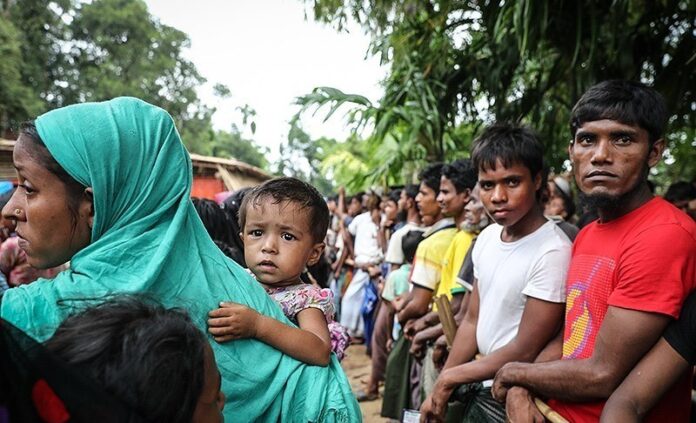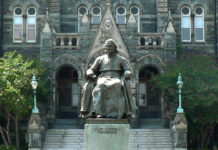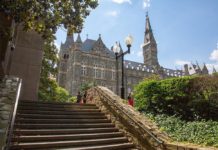![]()
“It is like breaking a mirror, and if you try to put the broken pieces together, it won’t look the way it did before.” This is how Imran Mohammad Fazal Hoque, a former Rohingya stateless person, describes the challenges of uplifting the Rohingya community of Myanmar, devastated by genocide and persecution.
Having taught himself to speak and write in English while in exile at Australia’s offshore detention center, Hoque later became a journalist and human rights activist. On November 6th, 2023, he participated in a discussion with fellows from Georgetown’s Berkley Center for Religion, Peace, and World Affairs. During the conversation, Hoque shared how writing ‘saved’ him and inspired his advocacy work within the Georgetown University community. This dialogue serves as a stark reminder of the ongoing suffering of the Rohingya community, still grappling with the aftermath of the horrendous genocide perpetrated against them by the Myanmar military six years ago. The systemic denial of formal education for Rohingya refugees in Bangladesh is a significant factor contributing to their further silencing and marginalization, trapping them in prolonged statelessness.
Background
The Rohingya is an ethnic group that has resided in Myanmar for centuries, practicing Islam in a country that is predominantly Buddhist. They speak Rohingya or Ruaingga, which is a dialect unique from any other local language.
The military coup that took over Myanmar in 1962 limited Rohingyas to foreign identity cards, and then completely denied them citizenship in 1982.
Approximately one million Rohingyas have become stateless ever since, deprived of citizenship and thereby not protected by any government or state law. In Myanmar, decades of nationalist anti-Muslim ethnic cleansing campaigns culminated in a military crackdown in 2016, creating a living hell that killed an estimated 24,000 Muslim Rohingyas and forced around 870,000 Rohingyas to flee to Bangladesh and some to other Southeast Asian countries.
Current Crisis
Though initially welcoming to Rohingya refugees, the Bangladeshi government’s attitude soon became indifferent, if not hostile as the crisis became protracted, lasting until today. The Rohingya refugees in Bangladesh are placed in crowded and under-supervised camps and are forbidden from working, making them dependent on humanitarian assistance for their daily survival. The Kutupalong refugee camp in Bangladesh hosting Rohingyas is the largest refugee camp in the world.
With a population larger than San Francisco crammed into approximately five sq. miles (13 sq. km), the living conditions are horrid: everywhere is dirty, houses are unbearably hot in the summer, the toilet is right above the dining and sleeping area and women are subject to constant threats of violence and rape. When the night falls and guards leave, bandits and gangs take control, claiming more than 40 lives in Kutupalong in 2022.
Though migration to flee from political violence and ethno-religious persecution is an enormous humanitarian problem facing many groups across the world today, the Rohingyas’ position is one of the most precarious among the refugee groups of the world, due to their lack of voice perpetuated by systematic denial of suffrage, education and the inaction of the international community.
Georgetown Professor Elizabeth Ferris, who has served as senior advisor to the UN Secretary-General and worked with refugee situations across the world, points out that the “lack of solutions for the Rohingya makes it one of the worst.”
The systemic denial of education
A major challenge facing Rohingya stateless persons, who have sought refuge in Bangladesh for the past decade, is the Bangladeshi government’s effort to underprovide the necessary resources and opportunities for Rohingyas to become economically self-sustainable and educated in Bengali.
Amnesty International estimates that half of Rohingyas that sought refuge in Bangladesh were under the age of 18. The prolonged statelessness causes them to miss out on crucial developmental stages and educational opportunities that are key to rebuilding the community.
The Myanmar government continues to deny citizenship and perpetuate brutal persecution against the Rohingya. These actions prevent Rohingya refugees from safely returning to their homeland, and belie the claims of the Myanmar government that they are ready to repatriate Rohingya refugees.
At the same time, the Bangladeshi government has struggled to balance prioritizing its national interests with upholding an international commitment to refugee protection with dwindling international assistance.
The Bangladesh government has made two repatriation attempts to get rid of Rohingya refugees, in 2018 and 2019, in spite of the precarious conditions in Myanmar. It has also offered Rohingya refugees “emergency level teaching” school curricula that are not recognized by Myanmar or its education system only. It has prohibited UN humanitarian agencies and NGOs, funded by international donors, from providing accredited education in refugee camps. Registered Rohingya students are barred from attending local Bangladeshi schools and specifically forbidden from being taught Bangla, the national language of Bangladesh. Educators in the camps described this systematic constraint on access to formal education as mirroring the discrimination that Rohingyas experienced in Myanmar, contributing to difficulties in finding employment and obtaining legal status.
The deprivation of education has implications for generations to come. The World Bank found that an additional year of a child’s education leads to a nine percent increase in earnings as an adult. The absence of schooling, especially for girls, creates greater economic and health challenges and contributes to a high rate of child marriage and gender inequality.
Due to decades of legal persecution and a deprived state of living, the Rohingya community has no written language, making preserving the Rohingya identity even more difficult. Many Rohingya children who fled to other countries such as the US cannot communicate with their parents because they cannot speak Ruaingga. Without effective communication, not only is the generational connection broken, but a shared history is lost.
The stateless Rohingyas are effectively a “lost generation” that struggles to live a stable, secure life all the while holding on to their ethnic-cultural legacies. The first step to preserving Rohingya identity and culture is to promote education and cultural history. Creative solutions that incorporate advanced technologies, such as online and living archives, are crucial ways to bridge the knowledge gap without a shared language.
Response of the International Community
The silence of the international community has made the Rohingya community feel forgotten and abandoned. The United Nations member countries, and the UN itself, have rarely acknowledged or condemned the Bangladeshi government’s systematic denial of formal education to Rohingya children, despite it being a blatant violation of the Convention on the Rights of the Child that Bangladesh ratified in 1990.
This acceptance contributes to a concerning lack of public awareness of the issue. “I teach [about the challenges of stateless Rohingyas] in my classes and I’m always amazed that for most of my students, it’s the first time they’ve heard about it,” said Professor Ferris, frustrated by Georgetown students’ lack of exposure to this crisis.
The recent USAID announcement of an additional $87 million to support Rohingya refugees and host communities in Bangladesh is heartening. However, providing humanitarian assistance alone does not suffice for a long-term plan to empower stateless Rohingyas. The Resettlement Initiative that was just established by the U.S. government to consider resettlement referrals of vulnerable Rohingyas is also unlikely to significantly improve the situation; the number of resettled individuals compared to over a million refugees in Bangladesh is insignificant.
“Millions of dollars in aid are given, for which we are grateful, but it barely reaches the target population,” writes Hoque, frustrated about the slow progress in truly uplifting Rohingya refugees around the world.
The key to solving this crisis lies in providing formal, accredited education to the stateless Rohingyas. Improving literacy and bringing the Rohingya perspective to essential international platforms are the lifeline for the Rohingya to recover from the trauma of genocide and exile, secure legal protection and preserve their cultural identity.
“Writing allows the world to know Rohingya people exist,” said Hoque.
What is Our Role?
The challenge to guarantee the provision of accredited formal education to Rohingya children and teenagers might seem insurmountable. However, as Professor Ferris points out, there are numerous success stories of other ethnic groups from Myanmar, such as the Karen, the Mon and the Karennia, adapting well and maintaining their cultures after settlement in another country.
So, what can the Georgetown community and students do to help empower the stateless Rohingyas?
Professor Ferris feels students should work to raise awareness of issues like this.
In addition to increasing student awareness, Hoque believes universities like Georgetown should provide scholarships for Rohingya students and create programs for high school students to expose them to different fields of study, helping them see their potential and the contribution they can make in their adopted country.
Sudipta Roy, a Research Fellow of the Berkley Center for Religion, Peace, and World Affairs, supports a tailored scholarship for Rohingya students. He further emphasizes that, in order to effectively welcome minority students into the dominant educational system, educational institutions must provide the necessary resources to help them adapt to the dominant classroom culture, bridge disparities in resources (both knowledge and language skills) and vigilantly check any biased treatment.
While well-intentioned, such a proposal could raise many practical questions: Should tailored scholarships also be offered to other minority ethnic groups that have been historically discriminated against or marginalized? Given the Supreme Court’s recent decision to ban affirmative action in college admission, how should educational institutions navigate the new legal environment? How would the provision of these scholarships impact financial aid to other students who qualify for need-based aid?
Answering these questions might be the first step towards uplifting the vulnerable Rohingya refugees in the U.S. and stateless Rohingyas still on their feet seeking refuge around the world.
To learn more about the day-to-day life of stateless people, check out this Ted Talk.











